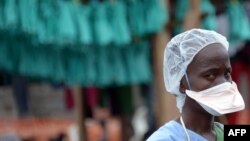Researchers in Uganda say they have developed a new Ebola test kit that detects the virus in minutes. Current tests for Ebola take anywhere from several hours to several days. The development is a potential milestone in the fight against the deadly virus.
According to researchers at Makarere University in Kampala, the new test can detect the virus already in the early stages of exposure.
Misaki Wanyengera, leader of the research group, says the test may be able to prevent future outbreaks like the one in West Africa that killed more than 11,000 people.
“We want a test that can run through the whole spectrum of infection. We don’t want a scenario where this gentleman, I forgot his name, from Liberia, gets on a plane and finally ends up in Texas," he said. "By the time someone develops temperature problems they’re already past 21 days of infection. So the test we’re developing should be able to capture people even before they develop their symptoms - you know the fever, the bleeding.”
The accuracy of the test has been verified by Grant Challenges Canada, a Canadian government-funded program that promotes health projects in low-income countries. The organization partially funded the research that developed the new test.
Easy to Use
Babirye Janet Peace, a lab technologist who was part of the rapid test kit's development, says it is very easy to use.
“It has a capturing antibody and then you bring in your sample and then you bring in your detecting antibody and the substrate to be able to visualize the reaction in the case there’s one," she said.
So with one drop of blood on a small piece of paper, medical workers will be able to detect if someone has Ebola within hours of initial exposure.
One of the biggest challenges with Ebola is that the virus is highly infectious. And with current methods, medical staff often need a laboratory and must carry out elaborate tests. This often proved quite challenging with the virus surfacing in remote forest villages.
Wanyengera says this new test breaks down these barriers.
“The first index cases that happen for Ebola outbreaks in Equatorial Africa, they happen in remote settings, village settings where there are no laboratories," he said. "So in the remote setting you need what we call a point of care test. A point of care test is something which can be done at the point of care outside the laboratory setting. It’s easy to use. You don’t need a lot of technical training.”
It has taken years to develop the new test kit. Initial steps were taken in 2007, after previous, smaller outbreaks in Uganda.
Funding research
One of the main challenges for the project was finding sufficient funding. But with the major epidemic in West Africa, donors were more willing to step in and fund the project.
Wayengera says profit can not be the driving factor when developing medical projects that can save lives.
“The model for funding interventions for diseases like Ebola must change. If you leave it only to the pharmaceuticals they’ll not deliver, because the pharmaceutical is only interested in profit," he said. "If I’m producing a kit that is running cheap, under $5 , ultimately how do I sustain it’s production in the sense that the people who’re involved in the production, how do I keep paying them so that this is sustained?”
A Uganda firm is currently developing the final test kits from the prototypes. The team is expected to roll out the new rapid test kits in about eight months.




